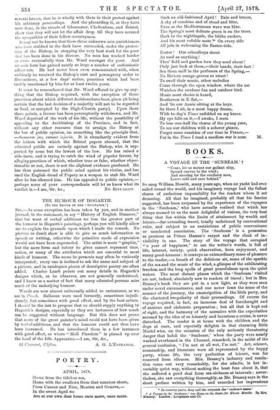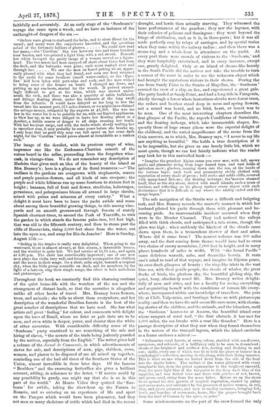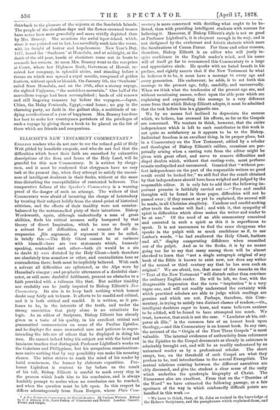BOOKS.
A VOYAGE IN THE ' SUNBEAM.' fi
"Come, let us mount our gallant ship, Spread canvas to the wind; And steering for the southern seas, Leave cold and care behind."
So sang William Howitt, many years ago, when no yacht had ever sailed round the world, and his imaginary voyage had the fullest charm of audacious impossibility for the readers whom it set dreaming. All that he imagined, probably all that his fancies suggested, has been surpassed by the experience of the voyagers in the Sunbeam,' who have actually realised that which has always seemed to us the most delightful of visions, the very best thing that lies within the limits of attainment by wealth and leisure,—far-extending travel, totally unfettered by conventional rules, and subject to no restrictions of public convenience or unselected association. The Sunbeam' is a possession as precious as Prince Hassan's carpet and the cloak of in- visibility in one. The story of the voyage that occupied " a year of happiness," to use the writer's words, is full of life, interest, variety, quick observation, keen enjoyment, and sunny good-humour ; it conveys an extraordinary sense of pleasure- to the reader,—a breath of the delicious air, some of the sparkle of the sea and the music of the wind, a glimpse of the exhilarating freedom and the long spells of great peacefulness upon the quiet waters. The most distant places which the Sunbeam' visited are not, indeed, absolutely new to readers of travel ; but in Mrs. Brassey's book they are put in a new light, as they were seen under novel circumstances, and one never loses the sense of the manner of the journey, the emancipation of the little party, and the chartered irregularity of their proceedings. Of course the voyage required, in fact, an immense deal of forethought and of anxious and elaborate preparation ; but all that is kept out of sight, and the harmony of the narrative with the expectation aroused by the idea of so leisurely and luxurious a cruise, is never disturbed. The reader is at home with the children and the dogs at once, and especially delights in that charming little Muriel who, on the occasion of the only seriously threatening danger that befell the Sunbeam,' when the party were nearly washed overboard in the Channel, remarked, in the midst of the general confusion, " I'm not at all wet, I'm not." Art, science, seamanship, and literature were all represented by the happy party, whose life, the very perfection of leisure, was far removed from idleness. Mrs. Brassey's industry and resolu- tion come out very remarkably, for she admits, in her in- variably quiet way, without making the least fuss about it, that she suffered a good deal from sea-sickness at intervals ; never- theless, she saw everything thoroughly, as Mr. Brassey says in the short preface written by him, and recorded her impressions.
• In country parts, they call the wryneek the" cuckoo's mats." t A rOpage in the Sunbeam e our Some on the Ocean for Eleven .Months. By Mrs. Brainy. London : Longman and Co.
faithfully and accurately. At an early stage of the ' Sunbeam's' voyage she came upon a wreck, and we have an instance of the unthought-of dangers of the sea :—
" Orders were given to starboard the helm, and to steer direct for the vessel; and many were the conjectures hazarded, and the questions
asked of the fortunate holders of glasses We could now read her name,—the ' Carolina.' She was between two and three hundred tons' burden, and was painted a light blue, with a red streak. Beneath her white bowsprit the gaudy image of a woman served as a figure- head. The two masts had been snapped off short about three feet from the deck, and the bulwarks were gone; each wave washed over and
through her We saw the men on board poking about, appar- ently pleased with what they had found, and soon our boat returned to the yacht for some breakers (small water-casks), as the ' Caro- lina' had been laden with port-wine and cork, and the men wished to bring some of the former on board. I changed my dress, and putting on my sea-boots, started for the wreck. It proved exceed- ingly difficult to get at the wine, which was stowed under- neath the cork, and there was also a quantity of cabin bulkheads and fittings floating about, under the influence of the long swell from the Atlantic. It would have delayed us too long to tow the vessel into the nearest port, 375 miles distant, or we might have claimed the salvage-money, estimated by the experts at £1,500. She was too low in the water for it to be possible for us, with our limited appliances, to blow her up, so we were obliged to leave her floating about as a derelict, a fertile source of danger to all ships crossing her track. With her buoyant cargo, and with the trade-winds slowly wafting her to smoother seas, it may probably be some years before she breaks up. I only hope that no good ship may run full speed on her some dark night, for the ' Carolina' would prove almost as formidable as a sunken rock."
The image of the derelict, with its precious cargo of wine, impresses one like the Erckmann-Chatrian conceit of the
voices heard in the cellar, proceeding from the forgotten wine- cask, in vintage-time. We do not remember any description of Madeira that gives such an idea of the beauty of the island as Mrs. Brassey's ; here is a glimpse of its floral treasures :—" The trellises in the gardens are overgrown with stephanotis, mauve and purple passion-flowers, and all kinds of rare creepers ; the purple and white hibiscus run up some fourteen to sixteen feet in height ; bananas, full of fruit and flower, strelitzias, heliotropes, geraniums, and pelargoniums bloom all around in large shrubs, mixed with palms and mimosas .of every variety." What a delight it must have been to leave the yacht awhile and roam about among these beautiful growing things, to ride among vine- yards and on smooth greensward through forests of stately Spanish chestnut-trees, to ascend the Peak of Teneriffe, to visit the garden in which stands the famous palm-tree, 101 feet high, that was old in the fifteenth century, and then to steam past the cliffs of Buenavista, rising 2,000 feet sheer from the water, out into the open sea, and away for Rio da Janeiro ! Here is Sunday, August 13th :—
" Sailing in the tropics is really very delightful. When going to the westward, there is almost always, at this season, a favourable breeze, and the weather is quite fair. Wo had service at 11.15 a.m., and again at 5.30 p.m. The choir has considerably improved; one of our now men plays the violin very well, and frequently accompanies the children and the nurse in their songs. On a clear, calm night, beneath a tropical sky, when the little group assemble on deck, and its members, by the light of a lantern, sing their simple songs, the effect is both melodious and picturesque."
Throughout the book we constantly find this charming contrast of the quiet home-life with the wonders of the sea and the strangeness of distant lands, so that the narrative is altogether unlike all other books of travel. Mrs. Brassey loves flowers, trees, and animals ; she tells us about them everywhere, and her description of the wonderful Brazilian forests is the best of the great number of descriptions that we have read. She has what artists call great ' feeling' for colour, and comments with delight upon the hues of Brazil, where no faint or pale tints are to be seen, and even white is deeper, purer, and clearer than the white of other countries. With considerable difficulty some of the
' Sunbeam' party contrived to see something of the sale and hiring of slaves, "the secrets of the trade being jealously guarded by the natives, especially from the English." The writer gives half a column of the Jornal do Commercio, in which advertisements of slaves for sale, and descriptions of men, pigs, children, cows, women, and pianos to be disposed of are all mixed up together, reminding one of the bad old times of the Southern States of the Union, almost incredible in these later days. Of the famous " Boulders " and the swarming butterflies she- gives a brilliant
Account, adding, in reference to the latter, " If nature could by any possibility be gaudy, one might say that she is so in this part of the world." At Monte Video they quitted the Sun- beam' for awhile, taking the river-boat up the Parana to Rosario, and so entering on an experience of life and sport on the Pampas which would have been pleasanter, had they not seen so many skeletons of cattle which had died in the recent
drought, and herds then actually starving. They witnessed the lasso performances of the gauchos ; they saw the lagunes, with their colonies of pelicans and flamingoes ; they went beyond the fringe of civilisation, such as it is, in those parts ; but it was all made perfectly easy by relays of carriages, and by special trains when they came within the railway radius ; and then there was a steam-tug and a whale-boat in attendance on the yacht. At every port there were crowds of visitors to the • Sunbeam,' and they were hospitably entertained, and in every instance, except one, greatly delighted. Only at an island of dream-like beauty in the South Pacific did the natives not take the trouble to turn a corner of the coast in order to see the unknown object which
had brought the mysterious visitors to their shores. During the run from Sandy Point to the Straits of Magellan, the Sunbeam' rescued the crew of a ship on fire, and experienced a great gale. The party landed at Sandy Point, and had a long ride in Patagonia, chiefly through a forest where laurestinus shrubs were forest trees, the cedars and beeches stood deep in moss and spring flowers, not a sound was heard, and no bird, beast, or insect was to be seen. One of the most interesting chapters describes the first glimpse of the Pacific, the superb Cordilleras of Sarmiento, and the floating icebergs, which take innumerable shapes, fre- quently those of huge swans (these were the especial delight of the children), and the varied magnificence of the scene from the Guia narrows, as to which, Mrs. Brassey says, " I never in my life saw anything so beautiful." She holds a true description of it to be impossible, but she gives us one lovely little bit, which we must quote, though we can but faintly indicate what the reader may look for in this unrivalled book :—
" Imagine the grandest Alpine scene you ever saw, with tall, snowy peaks and pinnacles rising from huge domed tops, and vast fields of unbroken snow ; glaciers, running down into the sea, at the heads of the various bays; each bank and promontory richly clothed with vegetation of every shade of green ; bold rocks and noble cliffs, covered with many-hued lichens; the floating icebergs; the'narrow channel itself, blue as the sky above, dotted with small islands, each a mass of verdure, and reflecting on its glassy surface every object with such distinctness that it is difficult to say whore the reality ended and the image began."
The safe navigation of the Straits was a difficult and fatiguing task, and Mrs. Brassey records the masterly manner in which her husband piloted his yacht through them with pleasant and be- coming pride. An unaccountable incident occurred when they were in the Messier Channel. They had noticed the valleys filled with thick clouds, and anticipated a rain-storm, though the glass was high ; when suddenly the blackest of the clouds came down upon them, in a tremendous shower of dust and ashes. Where did it come from ? The nearest volcano was 300 miles
away, and the dust coming from thence would have had to cross two chains of snowy mountains, 7,000 feet in height, and in many places hundreds of miles in width. With "the broad Pacific" came delicious warmth, calm, and dreamlike beauty. It rests one's mind to read of that voyage, and imagine its Elysian peace,
its ever-fresh glimpses of beauty ; the ring-like islets in the vast blue sea, with their gentle people, the shoals of whales, the great flocks of birds, the glorious sky, the beautiful gliding ship, the quiet, busy, absolutely novel life. Mrs. Brassey writes delight- fully of men and cities, and has a faculty for seeing everything and acquainting herself with the conditions of human life every- where, unsurpassed within our knowledge of travellers. She puts life at Chili, Valparaiso, and Santiago before us with picturesque reality ; and then we have the mid-ocean life once more, with charm- ing stories of the children, and the animals, and the islanders, until
the ' Sunbeam ' heaves-to at Amaun, the beautiful island over whose rampart of coral reef, " the first obstacle it has met for 4,000 miles, the sea breaks with a roar like thunder." Here is a
passage descriptive of what they saw when they found themselves in the waters of the tranquil lagoon, which the island encircles as a frame encloses a mirror :—
" Submarine coral forests, of every colour, studded with sea-flowers, anemones, and echiniths, of a brilliancy only to be seen in dreamland ; shoals of the brightest and swiftest fish, darting and flashing in and out ; shells, every one of which was fit to hold the place of honour in a conchologist's collection, moving slowly along, with their living inmates. This is what we saw when we looked down from the aide of the boat into the depths below. The surface of the water glittered with every imaginable tint, from the palest aquamarine to the brightest emerald, from the pure light blue of the turquoise to the deep dark blue of the sapphire, and was dotted hero and there with patches of red, brown, and green coral, rising from the mass below. Before us on the shore there spread the rich growth of tropical vegetation, shaded by palms and cocoa-nuts, and enlivened by the presence of native women, in red, blue, and green garments, and men in motley costumes, bringing fish, fowls, and bunches of cocoa-nuts, borne, like the grapes brought back from the land of Canaan by the spies, on poles."
Some misdemeanours on the part of the crew formed the only
drawback to the pleasure of the sojourn at the Sandwich Islands. The people of the cloudless days and the flower-crowned tresses have never been more gracefully and more vividly depicted than by Mrs. Brassey. She mentions the awful leper-island, which, since it was pointed out to her, has mercifully sunk into the ocean, with its freight of horror and hopelessness. New Year's Day, 1877, found the Sunbeam' at Honolulu, and at midnight, at the death of the old year, bands of choristers came out in boats to serenade her owners. At noon Mrs. Brassey went to the reception at Court, where her Highness Ruth, Governess of Hawaii, re- ceived her company, in splendid attire, and standing before a throne on which was spread a royal mantle, composed of golden feathers, without speck or blemish. On January 4th, the ' Sunbeam' sailed from Honolulu, and on the 28th, after a stormy voyage, she sighted Fujiyatna, " the matchless mountain." One half of the marvellous voyage had been accomplished ; lands of old renown and still lingering romance lay before the voyagers,—Japan, China, the Malay Peninsula, Egypt,—and home ; no gap in the charming party, no fault in the gallant ship, a multitude of un- dying recollections of a year of happiness. Mrs. Brassey has done her best to make her countrymen partakers of the privileges of such a voyage by giving them a book to be placed on the list of those which are friends and companions.




































 Previous page
Previous page